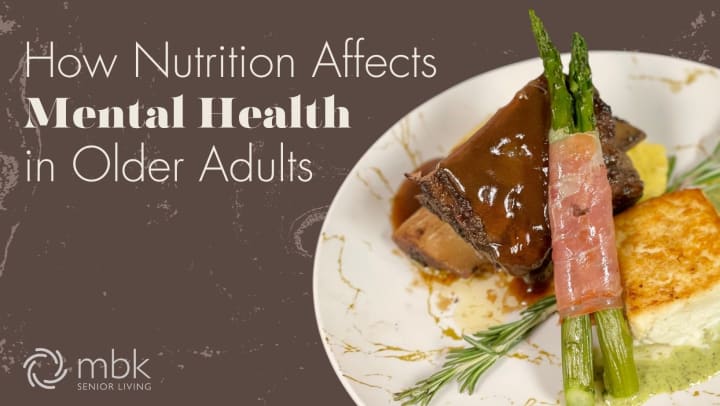You are what you eat. We’ve heard the saying time and time again but how does this change as we age? For seniors, food intake—what they eat and when they eat it—becomes more important than ever and plays a vital role in their overall well-being and mental health. This is true for everyone, but older adults have an increased risk of malnutrition and other nutrition-related problems that can negatively impact brain function and mood, contributing to accelerated aging, depression, and anxiety.
Seniors tend to experience problems with digestion, chewing, absorption of food, decreased appetite, and more that contribute to the risk of deficiencies in essential nutrients, such as vitamins, minerals, and fatty acids. Ensuring that older adults follow a proper diet to maintain healthy bodily functions is important. A poor diet can also lead to inflammation throughout the body, which has been linked to several conditions, including Alzheimer's disease and other forms of dementia.
Understanding How Nutrition Impacts Our Minds and Bodies
Nutrition deficiency can contribute to depression and anxiety. The gastrointestinal tract is often called the second brain, meaning the gut and brain are highly connected. Healthy eating promotes the growth and production of good bacteria and neurotransmitters such as dopamine and serotonin, which highly impact mental health.
When your body is producing the correct levels of these chemicals, it directly influences emotions and mood. A diet that is customized to your exact nutritional needs will allow your body to function properly and can help limit mood fluctuations and symptoms of depression, anxiety, and other mental health conditions.
According to the National Library of Medicine, it is imperative that the healthcare needs of older adults are addressed to combat the increasing chance of mood disorders and physical illness. The quality of one’s diet and nutritional intake can affect one’s interest in and ability to eat, which can further exacerbate symptoms and overall wellness. A diet that is customized to an individual’s exact nutritional needs will allow their body to function properly and help limit mood fluctuations and symptoms of depression, anxiety, and other mental health conditions.
It’s crucial to understand the impact of food on our bodies and minds as we age. Our digestive system becomes less effective, and we may develop intolerances, such as lactose intolerance. The quality of food we eat, how we eat it, and the times of day we eat can impact the benefits we receive from it.
“In this context, food is truly medicine. As the adage goes, tell me what you eat, and I'll tell you what you are. Food plays a critical role in the daily lives of our residents, and candidly is the most important event of the day for most,” said Matt Perez, MBK Senior Living’s National Director of Dining Services. “In senior living, we have a great responsibility to promote sustainability, but to unpack that further, I perceive sustainability not only in the products that we procure but the sustainability and empowerment of total person wellness through food. We understand this empowerment and work hard to craft menus that are celebratory of not only healthy and nutritious food items but also supporting the challenge of resident individuality.”
How a Healthy Diet Can Improve Mental Health in Seniors
Eating a healthy diet can help to reduce the risk of developing chronic diseases such as heart disease, stroke, diabetes, and cancer, which all contribute to the mental wellness of older adults. A healthy diet can also:
-
Boost energy levels and reduce fatigue
-
Improve mood and cognitive function
-
Reduce inflammation
-
Promote better sleep
-
Support a healthy weight
“Healthy eating to promote a long, healthy life is the foundation of the dining services we provide at our MBK communities. Our culinary programs are about joy and celebration as we strive to bring everyone to the table with our passion for great food,” Perez stated. “Our goal is to bring a smile to our residents through food. The culmination is what everyone craves—nutritious, expertly prepared, and beautifully presented meals that any foodie would love.”
Some of the ways MBK ensures healthy dining include:
-
A partnership with our MBK Fit program, we craft menu items that carry a special icon that indicates a better-for-you heart-healthy, bioavailable dining choice.
-
Utilizing an industry-leading menu management software that has over 6,000 recipes for our community culinarians to use when creating menus. This supports resident individuality and provides a great resource for our community team members to ensure heart-healthy menu items are available daily.
Maintaining an Active and Healthy Body With Food
Cooking can become challenging as we age, but it’s essential to maintain healthy eating habits. Food diaries and mindfulness while eating can help us understand our eating patterns and habits. Eating with others can also be important.
Making changes to promote a healthier lifestyle and diet can help to maintain an active and healthy body and has been shown to help prevent or slow the development of diseases such as high blood pressure, heart disease, diabetes, osteoporosis, and cancer.
Nutritional deficiencies have a direct impact on physical health. Poor nutrition can cause significant inflammation, weight loss, and frailty, which can lead to increased falls, balance issues, vulnerability to injuries and infections, slower recovery times, and more. In addition to the wide array of physical issues it causes, malnutrition can directly impact cognitive functions. A healthy diet aids in proper brain function and helps avoid impaired memory and cognitive decline.
A key factor to consider in the nutritional needs of older adults is what medications they are currently taking. Certain medications can limit the body’s ability to absorb nutrients and vitamins. It’s important to evaluate the nutrition of your loved one to see if they might benefit from dietary changes or the addition of dietary supplements.
Developing a healthy relationship with food and implementing good eating habits can help us live longer, healthier lives. Fats are necessary for brain support, while complex carbohydrates regulate fat metabolism and generate energy. Protein is essential for physical and mental health, especially during times of stress. Eating raw nuts, eggs, and vegetables can help us feel satisfied after meals. Drinking enough water and electrolyte solutions can prevent dehydration, which can lead to a lack of energy and dizziness.
Nutrition is a vital part of maintaining our physical and mental health, especially as we age. Assessing our food choices, developing healthy eating habits, and understanding the benefits and drawbacks of different foods can help us live longer, healthier lives. By incorporating these habits and paying attention to our bodies and minds, we can make informed decisions about our nutrition and overall health.





